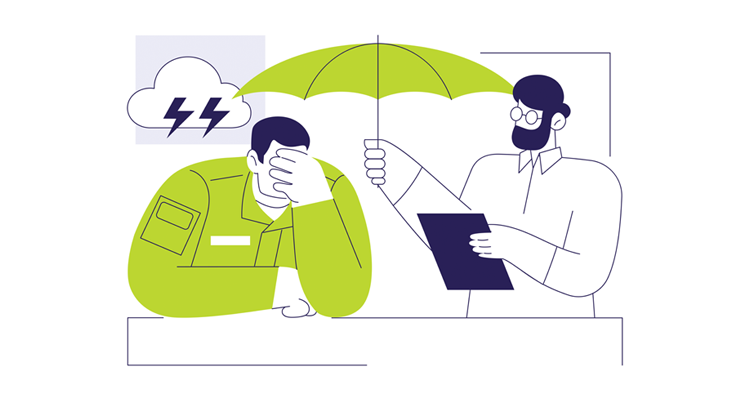Supporting Veterans on the Path to Opioid Recovery: Addressing Substance Use and Mental Health
Opioid use among veterans has been a growing issue over the last 20 years, and it continues to present unique challenges and requires a sensitive, well-informed approach to address the problem. The intersection of military service, chronic pain, mental health challenges, and the impact of opioids form a complex picture that demands specialized understanding from mental health providers. Here, we’ll discuss the scope of this issue, the contributing factors, and how providers can approach support and treatment in a way that aligns with veterans’ needs.
Veterans are at an increased risk of opioid misuse compared to the general population. Studies have shown that veterans have historically been more likely to receive opioid prescriptions for pain management, particularly for chronic pain, a common experience among those who have served. According to the U.S. Department of Veterans Affairs (VA), 60% of veterans who served in the Middle East or Afghanistan report experiencing chronic pain. With opioids often seen as a quick and effective solution for pain, any person can become dependent on these medications as a means of coping with their physical discomfort, which the mental health toll of service-related trauma can compound.

The opioid overdose crisis among U.S. military veterans increased by an estimated 53% between 2010 and 2019. It’s important to acknowledge and understand the unique interplay between biological, psychological, and social factors that uniquely impact this population. Effective solutions must be accessible, non-judgmental, and holistic, recognizing the complex, multi-layered origins of overdose risk. A low-threshold, wraparound approach—offering comprehensive, adaptable support—is vital to helping veterans mitigate these risks and promoting sustainable pathways to health and recovery.
The Department of Veterans Affairs (VA) has achieved a 67% reduction in opioid prescriptions for Veterans since 2012, emphasizing a Whole Health approach to pain management. Instead of solely relying on medication, the VA supports Veterans through comprehensive, evidence-based care that addresses the individual, offering services like nutrition counseling, exercise programs, sleep quality improvement, and relaxation techniques through personalized health plans. This success stems from the VA’s Opioid Safety Initiative, launched in 2013. The VA has committed to creating and implementing interdisciplinary pain management teams, updated opioid guidelines, and best practices over the last 10 years. Since the program’s inception, the VA has also reduced the number of patients using opioids and benzodiazepines together by 90%, long-term opioid use by 71%, and high-dose opioid prescriptions by 81%. VA’s efforts work to ensure that opioid prescriptions are largely reserved for short-term pain management, such as post-surgery care. Through continuous support and innovative pain management strategies, the VA remains dedicated to helping Veterans manage pain safely and live fulfilling lives.
Contributing Factors to Opioid Dependency Among Veterans
There are several interconnected factors that make veterans more vulnerable to opioid misuse:

Chronic Pain and Physical Injury: Many veterans live with long-term pain from injuries sustained during service, such as musculoskeletal injuries and nerve damage. These injuries are often treated with opioids, which can lead to dependence if other pain management strategies are not effectively integrated.

Mental Health Conditions: Post-Traumatic Stress Disorder (PTSD), depression, and anxiety are prevalent among veterans, and these mental health conditions can compound the struggle with physical pain. Veterans may misuse opioids in an attempt to alleviate both the physical and emotional pain they experience. Additionally, opioid dependency can further exacerbate mental health issues, creating a harmful feedback loop that makes treatment more complex.

Stigma and Access to Care: Many veterans face stigma around seeking mental health or substance use treatment, which can deter them from getting the help they need. Limited access to appropriate care, especially in rural areas, can make treatment more challenging. The lack of mental health support can also lead to self-medication with opioids, alcohol, or other substances.

Transition to Civilian Life: The transition from military to civilian life can be incredibly challenging, with veterans often struggling to find a new sense of identity and purpose. This transition may amplify feelings of isolation or despair, making veterans more vulnerable to substance misuse.
How Mental Health Providers Can Help
Listed below are six essential ways mental health providers can support recovery from opioid use in veterans.

Holistic Pain Management Approaches
Encourage veterans to explore alternative pain management therapies, such as physical therapy, acupuncture, yoga, and mindfulness-based stress reduction. Integrating these evidence-based approaches alongside traditional methods can reduce reliance on opioids and help veterans gain more control over their pain without medication dependency.

Trauma-Informed Care
Recognizing and addressing trauma is essential. Providers should be well-versed in trauma-informed care practices, ensuring that their approach acknowledges the lasting effects of trauma on mental and physical health. Tailored trauma therapies, such as EMDR (Eye Movement Desensitization and Reprocessing) or CBT (Cognitive Behavioral Therapy), can be highly effective in addressing PTSD and other service-related trauma.

Build Trust Through Empathy and Understanding
Veterans may be hesitant to share their struggles due to stigma or fear of judgment. Creating a nonjudgmental, empathetic environment can help build the trust necessary for effective treatment. Using respectful, culturally competent language and demonstrating a clear understanding of military culture can also strengthen rapport.

Dual Diagnosis Treatment
Since opioid misuse among veterans is often linked to mental health conditions, a dual-diagnosis approach that addresses both substance use and mental health disorders is essential. Providers should consider collaborating with or referring to addiction specialists, pain management experts, and VA resources that are experienced in addressing these co-occurring issues.

Encourage Peer Support and Community Connections
Support groups and peer mentorship programs can be invaluable for veterans, who may feel more comfortable opening up to others with similar experiences. Veteran-specific support networks such as the VA’s Vet Centers or organizations like the Wounded Warrior Project can provide a sense of camaraderie and understanding that promotes healing and recovery.

Educate and Advocate
Providers can play a critical role in educating veterans about the risks of opioid use and empowering them with alternative coping strategies. In addition to educating clients, providers can advocate for systemic changes that increase access to mental health and addiction services for veterans. Staying informed about VA initiatives, such as the Opioid Safety Initiative, can enhance a provider’s ability to support veterans effectively.
Veteran’s Resources:
In addition to these six strategies, we have compiled a list of resources for veterans who may be experiencing opioid misuse and for families and friends looking to support their loved ones.
Supporting veterans with opioid misuse issues requires a balance of sensitivity, empathy, and specialized knowledge. Mental health providers are uniquely positioned to help veterans regain control over their lives by creating a holistic treatment plan that respects their experiences and addresses both the psychological and physical dimensions of opioid misuse.
By combining trauma-informed care, alternative pain management, dual-diagnosis support, and community-based resources, providers can help veterans build resilience, manage their pain, and achieve a higher quality of life. Addressing these needs holistically is essential not only for the health of veterans but also for their reintegration into civilian life as valued members of society.
For many veterans, the path to opioid misuse begins with a well-intentioned prescription to manage pain from service-related injuries, as Marine veteran Austin Pollard describes: “You slowly start drifting away from what is normal.” Veterans face unique risk factors that heighten their vulnerability to opioid misuse, including high rates of chronic pain, mental health conditions like PTSD, and barriers to accessing support due to stigma and strict drug policies. With veterans twice as likely to die from an opioid overdose than civilians, the need for accessible, compassionate, and stigma-free treatment is critical. Breaking down these barriers and offering holistic, non-addictive pain management options can be life-saving, providing veterans with the support they need to reclaim their lives.
References
Bennett AS, Guarino H, Britton PC, O’Brien-Mazza D, Cook SH, Taveras F, Cortez J, Elliott L. U.S. Military veterans and the opioid overdose crisis: a review of risk factors and prevention efforts. Ann Med. 2022 Dec;54(1):1826-1838. doi: 10.1080/07853890.2022.2092896. PMID: 35792749; PMCID: PMC9262363.
NIDA. 2019, October 23. Substance Use and Military Life Drug Facts. Retrieved from https://nida.nih.gov/publications/drugfacts/substance-use-military-life on 2024, November 11
U.S. Department of Veterans Affairs. (2023). VA reduces number of Veterans prescribed opioids by 67% since 2012. VA News. https://news.va.gov/press-room/va-reduces-opioids-by-67-since-2012/
Blog Post Tags:
Related Blog Posts
Related Learning Labs
Related Resources
.
- Buscar Tratamiento de Calidad para Trastornos de uso de Sustancia (Finding Quality Treatment for Substance Use Disorders Spanish Version)
- Finding Quality Treatment for Substance Use Disorders
- Focus On Prevention: Strategies and Programs to Prevent Substance Use
- Monthly Variation in Substance Use Initiation Among Full-Time College Students
- The National Survey on Drug Use and Health (NSDUH) Report: Monthly Variation in Substance Use Initiation Among Adolescents







